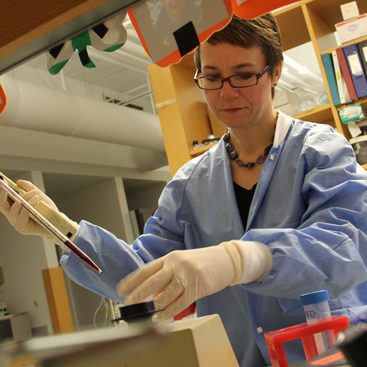Some Current Collaborators

David Lamb
Professor of Biomedical Sciences, Swansea University Medical School, Swansea, Wales Guest Investigator, WHOI
David's current major interests are in the genetic and biochemical characterisation of P450 hemoprotein enzyme systems. He has worked on the structure, function and regulation of P450 enzymes for over 25 years. He is an expert in P450 protein expression in E. coli, P450 spectral and activity assays, P450 and protein crystallography and the use of mass spectrometry in orphan P450 metabolomics and proteomics. Key research highlights include: crystallization and atomic resolution of 10 streptomycete P450 enzymes (producers of medical antibiotics); structural analysis of the first active eukaryotic NADPH cytochrome P450 reductase; characterization and crystallization of the first bifunctional cytochrome P450; elucidation of the endogenous roles of many P450s involved in antibiotic biosynthetic pathways; discovery and elucidation of viral P450s.
Joanna Wilson
Professor in Environmental Physiology, McMaster University, Hamilton ON, Canada
The Wilson research group focuses on both basic and applied areas of environmental sciences with a heavy interest in aquatic species. Her research intersects environmental physiology, toxicology, biochemistry, behaviour and bioinformatics and functional genomics.
Similar to the Stegeman lab, we study the evolution and function of cytochrome P450 enzymes in aquatic species. This protein superfamily that is important for production and metabolism of steroid hormones, and is absolutely critical for xenobiotic (i.e. drugs, environmental contaminants) metabolism. This work is essential to understand the potential for stressors to disrupt endocrine systems and to understand the toxicokinetics of xenobiotics. We have studies in a wide variety of species, from cnidarians to fish!
In our applied science, we study the impacts of environmental stressors and have a large interest in chemical stress (especially human drugs) and temperature stress. In this research, we tend to focus on the impact of stressors on different life stages and important biological processes such as reproduction and development.
View External Profile
Email: joanna.wilson@mcmaster.ca
Jennifer Schlezinger
Associate Professor of Environmental Health, Boston University School of Public Health
Guest Investigator, WHOI
In the Schlezinger laboratory, we seek to understand how exposure to environmental contaminants contributes to two pathological conditions, obesity and osteoporosis. The prevalence of each of these conditions is on the rise, and they are each significant health risks. Obesity and osteoporosis may seem like two unrelated conditions, but they are connected by shared biological pathways, pathways that can be exploited by environmental chemicals.
Metabolic disruptors are chemicals that act to control fat tissue development either by acting on the fat cells themselves or by altering food intake and metabolism by acting on the brain, pancreas, liver, gastrointestinal tract and muscle. We study four classes of metabolic disruptors, organotins (food crop fungicides, stabilizers used in plastics), phthalates (agents used to make plastics soft), polycyclic musks (fragrances) and organophosphate flame retardants (chemicals added to furniture foam and nail polish). We use three types of models to study the hypothesis that early life exposures to environmental pollutants can deregulate bone and fat tissue homeostasis over a life time: mammalian cell culture, an in vivo mouse model, and an in vivo zebrafish model. We collaborate with the Hahn and Stegeman laboratories at WHOI, using zebrafish to investigate chemical mechanisms of action in a whole animal model.
View External Profile
Email: jschlezi@bu.edu
Phone: 617.358.1708